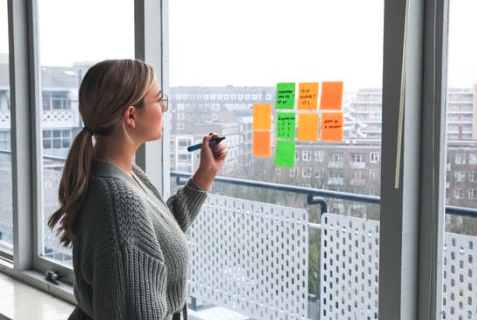How to Develop a Growth Mindset

Imagine having the ideal team: a group that thrives on personal and professional growth, embraces continuous learning, and achieves remarkable results together. Every once in a while, we find ourselves questioning our capabilities.
Can I do this? Is this a job I am meant to do? This is the same question we tend to ask ourselves when things turn even a bit harder. But guess what? This is normal and quite common, if I may add it. But regardless of how shaky and slow, those with a growth mindset are set to win the race.
Research has shown that our fixed or growth mindset, a core psychological concept, plays a crucial role in professional success. A fixed mindset, believing intelligence and talent are set in stone, can limit potential and hinder performance.
The good news? A growth mindset, where abilities are seen as constantly evolving through effort and learning, can unlock remarkable results for individuals and teams alike.

This blog post dives into the science behind the growth mindset concept, exploring its impact on performance and outlining actionable steps to help you and your team develop growth mindsets.
Get ready to discover how a simple shift in your own mindset can empower your employees, fuel innovation, and propel your organization to new heights.
Explore the definition of growth mindset and the growth mindset theory in more detail, providing practical tips to cultivate this valuable asset in your team and unlock your full potential for personal development.
The Dangers of a Fixed Mindset

To simply speak, those with fixed mindsets assume that their abilities are predetermined. This leads to:
Fear of Failure
The root of the Problem
A fixed mindset sees failure as a direct reflection of one’s intelligence or talent. This creates a fear of failure because failing means one is not “smart enough” or “talented enough.”
Impact on Growth
This fear can be paralyzing. People with a fixed mindset might avoid challenges altogether, opting for tasks they know they can succeed, even if they offer little growth. This hinders learning and exploration of new abilities.
Real-world Example
Imagine someone wanting to learn a new language. With a fixed mindset, they might avoid taking a class for fear of struggling or looking silly. This missed opportunity prevents them from developing their language skills.
Limited Potential
Self-Fulfilling Prophecy
Believing your intelligence is fixed sets an invisible ceiling on your potential. You might not even try to achieve something because you pre-determine you can’t do it.
Stagnation and Missed Opportunities
This mindset leads to stagnation. People might settle for what they already know or can do, never pushing themselves to learn or grow. This results in missed opportunities to develop new skills and pursue goals that might seem out of reach.
For Example, an athlete with a fixed mindset might believe they’re “not a natural runner” and give up on improving their speed, even though consistent training could lead to significant gains.
Difficulty with Feedback
Misconstrued Criticism
Constructive criticism is essential for growth. However, with a fixed mindset, feedback is seen as a personal attack on your intelligence. This can lead to defensiveness, anger, or a rejection of the feedback.
Hindered Growth
By shutting down feedback, you miss valuable opportunities to learn and improve. A coach’s pointers can help athletes refine their technique, while a teacher’s feedback can help students better understand a subject.
An employee with a fixed mindset might become upset if their boss points out areas for improvement in their work, believing it means they’re “not good enough” for the job. This prevents them from learning and developing their professional skills.
More than to one’s self

While a mixed mindset can hinder progress, a growth mindset is a powerful antidote. Its effects extend far beyond the individual, creating a ripple effect of positive change that invigorates ourselves and those around us.
Empowering Individuals, Strengthening Teams
Imagine a workplace transformed by a growth mindset. Challenges are no longer roadblocks but springboards for collective learning. Collaboration flourishes as team members embrace constructive criticism and actively support each other’s growth.
This supportive environment fosters higher morale and a breeding ground for innovative problem-solving. Unafraid of failure, individuals experiment with new ideas, leading to more effective solutions and a more robust, more cohesive unit.
Fueling Innovation, Driving Business Success
In today’s dynamic world, companies that embrace a growth mindset culture have a distinct advantage. A fixed mindset doesn’t confine employees. They actively seek opportunities to improve processes, develop new skills, and stay ahead of the curve.
This adaptability allows businesses to thrive in a constantly evolving environment. Imagine a company where employees view themselves as continuous learners and problem-solvers.
This collective effort creates a more innovative and competitive edge, propelling the business toward long-term success.
Building Stronger Communities
The impact of a growth mindset extends beyond the workplace, weaving its way into the fabric of our communities. When individuals believe in their ability to learn and grow, they become active and engaged members.
They take the initiative to tackle challenges, propose solutions, and contribute to positive change. This collective growth mindset fosters a vibrant and resilient community. People feel empowered to make a difference, leading to collaborative efforts that address local issues and create a better future for all.
The world craves progress, and a growth mindset propels it forward. By nurturing this mindset within ourselves and those around us, we can create a ripple effect of positive change, empowering individuals, strengthening businesses, and building stronger, more vibrant communities.
Signs of Having a Growth Mindset
People with a growth mindset exhibit these positive characteristics:
Embrace Challenges
Seeing the Silver Lining
People with a growth mindset don’t shy away from difficulties. Instead, they view them as opportunities to learn new skills, overcome obstacles, and grow stronger. Challenges become stepping stones on the path to mastery.
Growth Through Discomfort
They understand that stepping outside their comfort zone is necessary for growth. They might experience initial discomfort when facing a challenge but see it as a temporary hurdle to overcome.
Seek Feedback
Openness to Learning
People with a growth mindset understand that feedback is a gift, not a criticism. They actively seek constructive criticism from mentors, teachers, or colleagues because they see it as a valuable tool for improvement.
Turning Feedback into Action
They don’t just listen to feedback; they use it to take action. They analyze the feedback, identify areas for improvement, and develop strategies to implement the suggestions.
Persist Through Setbacks
Resilience in the Face of Failure
Everyone experiences setbacks. People with a growth mindset see them as temporary roadblocks, not permanent failures. They possess the resilience to bounce back, learn from the experience, and keep moving forward.
Effort Over Outcome
While they strive for success, they focus more on their effort than the immediate outcome. They understand that the learning and growth process takes time and perseverance.
How to Develop a Growth Mindset

Cultivating a growth mindset is a powerful tool for personal and professional development; anyone can develop it with some effort. Let’s break down those steps to unpack the “how” behind this positive change:
Self-awareness
This is the foundation. Catch yourself when you fall into negative self-talk. Instead of “I can’t,” try reframing it as “This is challenging, but I’m willing to learn.” Notice the shift from a fixed mindset (“I can’t”) to a growth mindset (“I’m willing to learn”).
Embrace challenges
Instead of dreading complex tasks, see them as opportunities to stretch your abilities and gain new skills. Approach them with curiosity and a willingness to experiment.
Learn from failures
We all make mistakes, but with a growth mindset, they become valuable learning experiences. Analyze what went wrong and what you could have done differently, and use that knowledge to improve next time.
Seek feedback
Don’t be afraid to ask for constructive criticism from mentors, colleagues, or friends. Feedback can highlight areas for improvement you might not have noticed yourself.
Growth mindset practices
Here’s where you put your newfound mindset into action. Set goals that focus on learning and development, not just achievement. Practice gratitude for your positive and negative experiences, as they all contribute to your growth.
Finally, make continuous learning a habit. Read books, take courses, or try new things to keep your mind sharp and engaged.
Enjoying the Learning Process

Developing a growth mindset goes beyond achieving goals; it’s about embracing the entire learning process. Here’s how you can enhance your journey:
Fuel Your Internal Fire:
- Find intrinsic motivation: Instead of chasing external validation like praise or awards, seek the inherent satisfaction of learning and mastering new things. Focus on the joy of discovery and the process of improvement.
Embrace the Learner’s Mindset
- Cultivate curiosity: Approach challenges and new experiences with a childlike wonder. Ask questions, explore different approaches, and don’t be afraid to experiment. This keeps learning fresh and engaging.
Celebrate Every Step
- Celebrate small wins: Big achievements are fantastic, but don’t discount the importance of celebrating smaller milestones. Acknowledge your progress, no matter how incremental. This reinforces your growth mindset and keeps you motivated.
Reflect and Savor
- Mindfulness and reflection: Take time to reflect on your learning journey. Journal about your experiences, what you learned, and how you overcame obstacles. Appreciating your growth reinforces the positive aspects of the process and motivates you to keep going.
The world unfolds with endless possibilities for those who cultivate a growth mindset. Inherent talents blossom with dedication and perseverance. Challenges morph into springboards, propelling individuals toward greater heights.
Missteps become valuable lessons etched in the ever-expanding map of knowledge. With this empowering perspective, one can flourish not only within one’s career but in all facets of life.
This is your chance to claim agency. Reflect on your current approach. Do obstacles appear as insurmountable walls or exciting hurdles waiting to be conquered?
Are you receptive to the constant pursuit of learning and growth? Begin by incorporating just one or two growth mindset practices into your daily routine.
Witness the transformative effect it has on your confidence, your abilities, and your overall success.

For more information on Vista Land’s developments nationwide, visit

